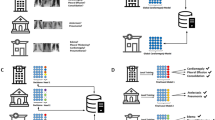Abstract
Deep learning models have achieved state-of-the-art in many challenging domains, whereas it is a data-hungry method. Collecting sensitive and labelled medical data sets is challenging and costly. Recently, federated learning has been used to train a model without sharing the data at a central place for a single task. We propose a novel Multi-task federated learning (MTFL) approach to utilize the data sets of various similar kinds of tasks. We used two binary class X-ray data sets: Pneumonia disease classification and TB disease classification. We compared MTFL with federated learning for a single task and CNN with data in one place. Results show that MTFL has achieved better specificity and accuracy than other models.
Access this chapter
Tax calculation will be finalised at checkout
Purchases are for personal use only
Similar content being viewed by others
References
Abdulrahman, S., Tout, H., Ould-Slimane, H., Mourad, A., Talhi, C., Guizani, M.: A survey on federated learning: the journey from centralized to distributed on-site learning and beyond. IEEE Internet Things J. 8(7), 5476–5497 (2021). https://doi.org/10.1109/JIOT.2020.3030072
Argyriou, A., Evgeniou, T., Pontil, M.: Multi-task feature learning. In: Advances in Neural Information Processing Systems, vol. 19 (2006)
Beguier, C., Terrail, J.O.d., Meah, I., Andreux, M., Tramel, E.W.: Differentially private federated learning for cancer prediction. arXiv preprint arXiv:2101.02997 (2021)
Brisimi, T.S., Chen, R., Mela, T., Olshevsky, A., Paschalidis, I.C., Shi, W.: Federated learning of predictive models from federated electronic health records. Int. J. Med. Inform. 112, 59–67 (2018)
Guan, Q., Huang, Y., Zhong, Z., Zheng, Z., Zheng, L., Yang, Y.: Diagnose like a radiologist: attention guided convolutional neural network for thorax disease classification. arXiv preprint arXiv:1801.09927 (2018)
Hesamian, M.H., Jia, W., He, X., Kennedy, P.: Deep learning techniques for medical image segmentation: achievements and challenges. J. Digit. Imaging 32(4), 582–596 (2019)
Hua, K.L., Hsu, C.H., Hidayati, S.C., Cheng, W.H., Chen, Y.J.: Computer-aided classification of lung nodules on computed tomography images via deep learning technique. OncoTargets Therapy 8 (2015)
Islam, M.T., Aowal, M.A., Minhaz, A.T., Ashraf, K.: Abnormality detection and localization in chest x-rays using deep convolutional neural networks. arXiv preprint arXiv:1705.09850 (2017)
Kumar, P., Grewal, M., Srivastava, M.M.: Boosted cascaded convnets for multilabel classification of thoracic diseases in chest radiographs. In: Campilho, A., Karray, F., ter Haar Romeny, B. (eds.) ICIAR 2018. LNCS, vol. 10882, pp. 546–552. Springer, Cham (2018). https://doi.org/10.1007/978-3-319-93000-8_62
Lakhani, P., Sundaram, B.: Deep learning at chest radiography: automated classification of pulmonary tuberculosis by using convolutional neural networks. Radiology 284(2), 574–582 (2017)
Maier, A., Syben, C., Lasser, T., Riess, C.: A gentle introduction to deep learning in medical image processing. Z. Med. Phys. 29(2), 86–101 (2019)
McMahan, B., Moore, E., Ramage, D., Hampson, S., Arcas, B.A.: Communication-efficient learning of deep networks from decentralized data. In: Artificial intelligence and statistics, pp. 1273–1282. PMLR (2017)
Mooney, P.: Chest x-ray images (pneumonia) (2021). https://www.kaggle.com/datasets/paultimothymooney/chest-xray-pneumonia
Nafisah, S.I., Muhammad, G.: Tuberculosis detection in chest radiograph using convolutional neural network architecture and explainable artificial intelligence. Neural Comput. Appl. 1–21 (2022)
Pfitzner, B., Steckhan, N., Arnrich, B.: Federated learning in a medical context: a systematic literature review. ACM Trans. Internet Technol. (TOIT) 21(2), 1–31 (2021)
Rajpurkar, P., et al.: Chexnet: radiologist-level pneumonia detection on chest x-rays with deep learning. arXiv preprint arXiv:1711.05225 (2017)
Rieke, N., et al.: The future of digital health with federated learning. NPJ Digit. Med. 3(1), 1–7 (2020)
Ruder, S.: An overview of multi-task learning in deep neural networks. arXiv preprint arXiv:1706.05098 (2017)
Singh, P.P., Prasad, S., Chaudhary, A.K., Patel, C.K., Debnath, M.: Classification of effusion and cartilage erosion affects in osteoarthritis knee MRI images using deep learning model. In: Nain, N., Vipparthi, S.K., Raman, B. (eds.) CVIP 2019. CCIS, vol. 1148, pp. 373–383. Springer, Singapore (2020). https://doi.org/10.1007/978-981-15-4018-9_34
Standley, T., Zamir, A.R., Chen, D., Guibas, L., Malik, J., Savarese, S.: Which tasks should be learned together in multi-task learning? (2019). https://doi.org/10.48550/ARXIV.1905.07553, https://arxiv.org/abs/1905.07553
Tawsifur Rahman, Muhammad Chowdhury, A.K.: Tuberculosis (tb) chest x-ray database (2021). https://www.kaggle.com/datasets/tawsifurrahman/tuberculosis-tb-chest-xray-dataset
Xu, J., Glicksberg, B.S., Su, C., Walker, P., Bian, J., Wang, F.: Federated learning for healthcare informatics. J. Healthc. Inform. Res. 5(1), 1–19 (2021)
Zhang, C., Xie, Y., Bai, H., Yu, B., Li, W., Gao, Y.: A survey on federated learning. Knowl.-Based Syst. 216, 106775 (2021). https://doi.org/10.1016/j.knosys.2021.106775, https://www.sciencedirect.com/science/article/pii/S0950705121000381
Zhang, Y., Yang, Q.: A survey on multi-task learning. IEEE Trans. Knowl. Data Eng. 1 (2021). https://doi.org/10.1109/TKDE.2021.3070203
Author information
Authors and Affiliations
Corresponding author
Editor information
Editors and Affiliations
Rights and permissions
Copyright information
© 2023 The Author(s), under exclusive license to Springer Nature Switzerland AG
About this paper
Cite this paper
Kumar, P., Sinha, I.K., Singh, K.P. (2023). MTFL: Multi-task Federated Learning for Classification of Healthcare X-Ray Images. In: Gupta, D., Bhurchandi, K., Murala, S., Raman, B., Kumar, S. (eds) Computer Vision and Image Processing. CVIP 2022. Communications in Computer and Information Science, vol 1777. Springer, Cham. https://doi.org/10.1007/978-3-031-31417-9_43
Download citation
DOI: https://doi.org/10.1007/978-3-031-31417-9_43
Published:
Publisher Name: Springer, Cham
Print ISBN: 978-3-031-31416-2
Online ISBN: 978-3-031-31417-9
eBook Packages: Computer ScienceComputer Science (R0)




